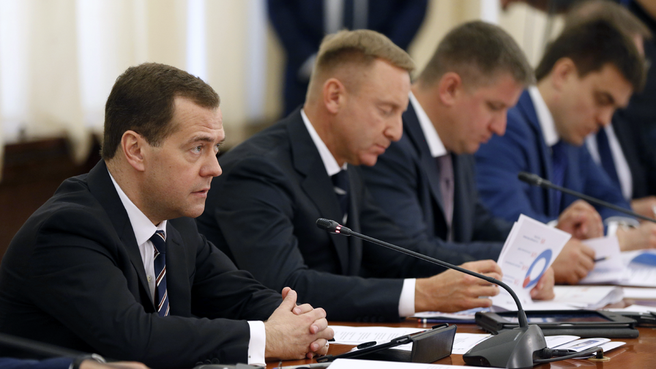The midterm status of Russia’s Food Security Doctrine and the next steps in the effort will be highlighted at the National Food Security Forum to be held for the first time.
Excerpts from Dmitry Medvedev’s remarks at the plenary meeting of the National Food Security Forum:
Food security is one of our most important goals today. In fact, Russia has always needed it, but for almost a year now we have been living under food import restrictions, which we put in place to stimulate the growth of domestic agricultural companies. If we take a longer view, the agricultural sector has received extensive government support over the last 10 years. We have used various instruments for this purpose. I myself initiated a national project for the development of agriculture and related industries. In fact, it was only the first step toward building a government support system for domestic agriculture, and its results were then incorporated into state programmes and the food security doctrine.
The main purpose of the document is to identify the strategic areas that ensure food security in Russia. From an economic perspective, it is about building modern agriculture. For people it means access to high-quality and affordable products. And overall, it’s about promoting the stable and sustainable development of the entire country.
Everything we included in the doctrine then is still vital and extremely relevant, as evidenced by the sector’s performance results in 2014. That was a turning point for us. The past 10 months since the introduction of the special economic measures have shown that Russia is capable of feeding itself.
It is a fact everyone has to reckon with now – those in other countries who had ideas on the matter, along with all the local sceptics who believed that a country like Russia would have to import large quantities of food for a long time. Of course, those who would like to work with us but have lost some good opportunities on the Russian market because of the sanctions will have to reckon with it as well.
Clearly, it will take time for the goals outlined in the doctrine to be achieved, which is why its implementation period lasts until 2020.
Last year, we ensured the local supply of four out of eight kinds of products that we absolutely need for food security – grain, sugar, vegetable oil and potatoes. The results actually exceeded the targets in the doctrine. We have had no such success with the remaining four types of food yet – meat, milk, fish and salt, but there has been an upward trend there as well.
In general, our agricultural sector is growing more competitive. Exports of agricultural products and foodstuffs rose by more than 40% last year. And we're not going to stop there.
We need to give more attention to small businesses, to invest in the development of the breeding base for livestock farming and in fish farming, to restore the Russian seed industry, to develop rural areas, and to develop the production of agricultural machinery.
Import substitution is now a natural component of Russia’s food policy. Preliminary results are quite acceptable. Food imports fell by almost a third in the first five months of our embargo, and although our traditional partners, especially in Europe, are gone, the domestic market has barely noticed their absence. Certain prices do remain a problem, but at the same time the supply of domestic products and certain imports from other countries have significantly increased.
To promote the growth of the domestic market, we have launched five new projects under a state programme, which should lead to increased production of vegetables, fruit, milk and meat, the development of selective breeding and genetics and, of course, it’ll help us build a system of support for low-income people.
The planned amount of state support this year is even greater than in the past. In 2014, we allocated 187 billion roubles for the state programme, and in 2015, it was 220 billion roubles.
Will the counter-sanctions, or restrictive measures, be extended? Officially, we introduced them for a year, that is, until 8 August 2015, in response to the actions of our European, American and other partners. Naturally, our subsequent actions will depend on what our partners choose to do. Judging by their statements, they still do not want to return to our market and do not plan to, and, well, we are not going to beg.
But the counter-sanctions – restrictive measures, or embargo – are not even the point anymore. Russia will consistently implement its food policy. Sanctions or no, we have taken this path and will not deviate from it.
Our strategic goals remain the same – modern agriculture, a high-tech food industry, a competitive trading system, and modern machinery production. All of that should lay the groundwork for food security. All the decisions that have been taken during the past year to support agriculture will remain in place, including the amount of financing, which will be increased with more or less stable economic growth.













